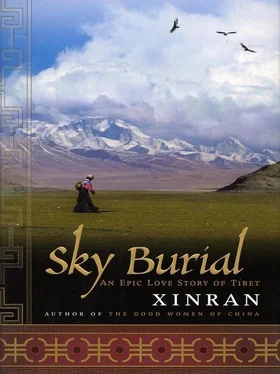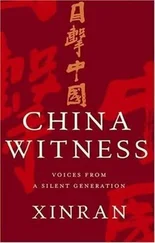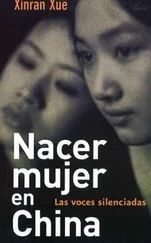
Xinran Xue
Sky Burial, An Epic Love Story of Tibet
© 2004
Translated from Chinese by Julia Lovell and Esther Tyldesley
For Toby
who knows how to share
love and experience
space and silence
This version of Sky Burial differs slightly from the Chinese original. During the translation process, the author worked with her translators and editor to make sure that all elements of the book were accessible to non-Chinese readers.
In Chinese names, the surname is placed before the first name. Shu Wen’s first name is therefore Wen.

In 1994 I was working as a journalist in Nanjing. During the week, I presented a nightly radio program that discussed various aspects of Chinese women’s lives. One of my listeners called me from Suzhou to say that he had met a strange woman in the street. They had both been buying rice soup from a street vendor and had started talking. The woman had just come back from Tibet. He thought that I might find it interesting to interview her. She was called Shu Wen. He gave me the name of the small hotel where she was staying.
My curiosity awakened, I made the four-hour bus journey from Nanjing to the busy town of Suzhou, which despite modern redevelopment still retains its beauty-its canals, its pretty courtyard houses with their moon gates and decorated eaves, its water gardens, and its ancient tradition of silk making. There, in a teahouse belonging to the small hotel next door, I found an old woman dressed in Tibetan clothing, smelling strongly of old leather, rancid milk, and animal dung. Her gray hair hung in two untidy plaits and her skin was lined and weather-beaten. Yet, although she seemed so Tibetan, she had the facial characteristics of a Chinese woman-a small, slightly snub nose, an “apricot mouth.” When she began to speak, her accent immediately confirmed to me that she was indeed Chinese. What, then, explained her Tibetan appearance?
For two days, I listened to her story. When I returned to Nanjing my head was reeling. I realized that I had just met one of the most exceptional women I would ever know.
I never saw her again, but her story did not leave my mind, so finally I felt I must share it with others.
Her inscrutable eyes looked past me at the world outside the window-the crowded street, the noisy traffic, the regimented lines of modern tower blocks. What could she see there that held such interest? I tried to draw her attention back.
“How long were you in Tibet?”
“More than thirty years,” she said softly.
“Thirty years! But why did you go there? For what?”
“For love,” she answered simply, again looking far beyond me at the empty sky outside.
“For love?”
“My husband was a doctor in the People’s Liberation Army. His unit was sent to Tibet. Two months later, I received notification that he had been lost in action. We had been married for less than a hundred days.
“I refused to accept that he was dead,” she continued. “No one at the military headquarters could tell me anything about how he had died. The only thing I could think of was to go to Tibet myself and find him.”
I stared at her in disbelief. I could not imagine how a young woman at that time could have dreamed of traveling to a place as distant and as terrifying as Tibet. I myself had been on a short journalistic assignment to the eastern edge of Tibet in 1984. I had been overwhelmed by the altitude, the empty awe-inspiring landscape, and the harsh living conditions.
“I was a young woman in love,” she said. “I did not think about what I might be facing. I just wanted to find my husband.”
I had heard many love stories from callers to my radio program, but never one like this. My listeners were used to a society where it was traditional to suppress emotions and hide one’s thoughts. I had not imagined that the young people of my mother’s generation could love each other so passionately. People did not talk much about that time, still less about the bloody conflict between the Tibetans and the Chinese. I yearned to know this woman’s story, which came from a time when China was recovering from the previous decade’s devastating civil war between the Nationalists and Communists, and Mao was rebuilding the motherland.
“How did you meet your husband?”
“In Nanjing,” she replied, her eyes softening slightly. “I was born there. Kejun and I met at medical school.”
That morning, Shu Wen told me about her youth. She spoke like a woman who was unused to conversation, pausing often and gazing into the distance. But even after all this time, her words burned with love for her husband.
“I was seventeen when the Communists took control of the whole country in 1949. I remember being swept up in the wave of optimism that was flooding China. My father worked as a clerk in a Western company. He hadn’t been to school, but he had taught himself. He believed strongly that my sister and I should receive an education. We were very lucky. Most of the population at this time were illiterate peasants. I went to a missionary school and then to Jingling Girls College to study medicine. The school had been started by an American woman in 1915. At that time there were only five Chinese students. When I was there, there were more than one hundred. After two years, I was able to go to the university to study medicine. I chose to specialize in dermatology.
“Kejun and I met when he was twenty-five and I was twenty-two. When I first saw him, he was acting as a laboratory assistant to the teacher in a dissection class. I had never seen a human being cut up before. I hid like a frightened animal behind my classmates, too nervous even to look at the white corpse soaked in formalin. Kejun kept catching my eye and smiling. He seemed to understand and sympathize with me. Later that day, he came looking for me. He loaned me a book of colored anatomy diagrams. He told me that I would conquer my fear if I studied them first. He was right. After reading the book several times over, I found the next dissection class much easier. From then on, Kejun patiently answered all my questions. Soon he became more than a big brother or a teacher to me. I began to love him with all my heart.”
Shu Wen’s eyes were so still-locked on something I couldn’t see.
“Everybody admired Kejun,” she continued. “He had lost all his relatives during the Sino-Japanese War, and the government had paid for him to go to medical school. Because he was determined to repay this debt, he worked hard and was an outstanding student. But he was also kind and gentle to everyone around him, particularly to me. I was so happy… Then Kejun’s professor came back from a visit to the battlefields of the Korean War and told Kejun of how the brave soldiers who were hurt and crippled in those terrible battles had to do without doctors and medicine, how nine out of ten of them died. The professor said he would have stayed there to help if he hadn’t thought it his responsibility to pass on his medical knowledge to a new generation, so that more hospitals could have trained surgical staff. In war, medicine was the only lifeline: whatever the rights and wrongs of combat, saving the dying and helping the wounded were heroic acts.
“Kejun was deeply impressed by what his mentor had told him. He talked to me about it. The army was in desperate need of surgeons to help its wounded. He felt he ought to join up. Although I was frightened for him, I didn’t want to hold him back. We were all suffering hardship at that time, but we knew it was for the greater good of the country. Everything was changing in China. Many people were packing their bags and heading for poor rural areas to carry out land reform, or going to the barren, uninhabited borderlands to turn the wilderness into fields. They went to the northeast and northwest to look for oil, or deep into the mountains and forests to fell trees and build railways. We regarded separation from our loved ones as a chance to demonstrate our loyalty to the motherland.”
Читать дальше














